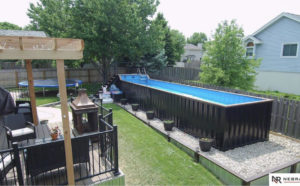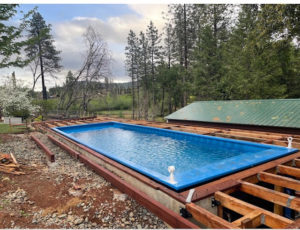

Welcome to Seventeenpools.com blog
I understand completely the mindset of the pool owner who wants to find an alternative to chlorine and I am at risk of losing you as a reader right now because I am not giving you the information that you want to hear. I deal with that a lot as a pool professional. I prefer however to make informed readers and listeners and I encourage you to continue reading even though I have just crapped all over every one of the chlorine alternatives you have been researching. But all is not lost. I do have some good news for you and I think this is a great compromise that we can meet in the middle with.
You want an alternative to chlorine because who wants more chemicals in their lives, right? Usually it comes down to the kids as well because they are smaller and in the water so much. They practically drink a pitcher of pool water per day when they are out there splashing around all day. This is the reason that you don’t want chlorine in the water, but strangely also the main reason that I do want you to have chlorine. The ability to hold a residual value in the water is really hard for alternatives to chlorine. This is why you should keep using chlorine, but the good news is that chlorine is actually pretty awesome, and can work with almost any other system or chemical process out there. This is without a doubt the secret to the cleanest, healthiest and safest water in a swimming pool. Utilizing more than one system and specifically selecting your water management system to have synergy.
An example of synergy in a pool water maintenance system would be first of all to use chlorine as your baseline for safety. It works, we can test it to verify, and we can manage the levels of chlorine readily in the water by maintaining pH, total alkalinity and cyanuric acid within the correct ranges. Now, add in a piece of peripheral equipment or a chemical from the original list above and you can benefit from both. One tried and true combo is chlorine along with a germicidal UV light. If you had to find a weak link for chlorine there might be two things you could point out:
Chloramine buildup – You need to measure free chlorine in your pool but also the total chlorine so that you can deduce the combined chlorine level in the water. Combined chlorine is the chlorine in your water that has found some bacteria or organic debris to attach to, or combine with. This combined chlorine no longer shows up on your free chlorine test, but it does in the total chlorine test. Combined chlorine should be zero, but as it grows and approaches 1 part per million the water will begin to smell like chlorine. When you complain of a pool that smells like chlorine you are noticing one of the weak aspects of chlorine as a stand alone solution, in that you need to do something called breakpoint chlorination, which some pool owners mistake as “shocking” the pool. In essence you need to raise your chlorine levels very high for a while to burn off the combined chlorine such that your free chlorine reading and total chlorine reading become the same. Clear as mud right? Chlorine gets used up, and needs a huge blast of more chlorine to get rid of that used up stuff which kind of smells bad and makes your eyes itchy.
cryptosporidium – Exactly as in the example above, with cryptosporidium chlorine lacks the ability to kill this important parasite. Or more accurately it lacks the ability to kill cryptosporidium within an appropriate timescale based on the levels of free chlorine normally maintained in pool water. It is not just enough that your sanitizer works eventually, it must do so within an aggressively fast timeline. This is why something like silver is not suitable as a stand alone solution in your pool water despite having some known bactericide properties. It is because the timescale to kill things in the water at the levels maintained in pools is insufficient, by quite a long shot actually. At 1ppm free chlorine almost everything dangerous in pool water is dead within 60 seconds or less. Silver is measured in hours or days, which is not even in the same world as 60 seconds or less. However cryptosporidium has an outer shell often described like a basketball that low levels of chlorine would take hours or days to kill. Even weeks. Which is why superchlorination, or shocking, should be done to the pool periodically. This is expressly because chlorine lacks the ability to kill this one problematic parasite. You can check out more of our blogs and information at www.seventeenpools.com

